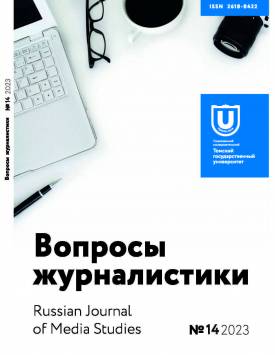Functioning of the social evaluation marker in the media text: A retrospective analysis (the word negodyay in the media in 1993–2023)
The article examines special speech means characteristic of a media text -markers of social meanings, in particular, words with a negative connotation that form a negative attitude of the audience towards the objects nominated with their help. As an example of such a word, the noun negodyay [scoundrel] is considered. The aim of the article is to identify trends inherent in the functioning of negativism in journalistic materials of recent decades. The source of empirical material was publications of the Kommersant publishing house in 1993, 20o3, 2013, and 2023. A linguistic and stylistic analysis of the texts was carried out. The author compared the semantic and stylistic characteristics of the word negodyay in explanatory dictionaries of the Russian language and the implementation of the semantic and pragmatic potential of the word in media texts. Based on the results of the study, the author infers that negativism can form a negative image of the subject of speech, make the style lower and more conversational, and reduce the communicative distance between the media and the audience. The blurring of stylistic boundaries and vulgarizing the language of the media was one of the distinctive features of Russian journalism in the 1990s. During this period, the noun negodyay was often used to refer to specific individuals and actively functioned not only in other people’s speech, but also in journalist’s speech. Subsequently, the word began to be used more often in quotations, being a newsmaker’s means of speech characterization. One of the actively used techniques was the use of the word negodyay as a marker of someone else’s style and alien worldview. In the 2010s, the number of microcontexts in which the ironic use of the word is recorded increased. The author of the article calls this speech move “ironic distancing” of the journalist from the object of publication. In the materials of 2023, journalistic texts contain no uses of negodyay in relation to real persons. This suggests that, in high-quality media, the frank journalistic expression of the 1990s was replaced by stylistic balance, emphasized by the objectivity of tone. In the conclusion, the author notes that the stylistically low, yet literary-language negativism negodyay is in demand in modern Russian media speech as an expressive means. It enhances the effect of “live communication”, ensures an accurate reproduction of an emotional statement, and at the same time gives the journalist the opportunity to ironically distance oneself from the position of a person whose vocabulary the given word is attributed to. The way the noun negodyay functions in mass communication reveals the essential features of today’s media speech, balancing on the brink of objective and subjective, literary and vulgar, serious and ironic. The author declares no conflicts of interests.
Keywords
social evaluation, media text, negativism, expression, ironyAuthors
| Name | Organization | |
| Basovskaya Evgenia N. | Russian State University for the Humanities | jeni_ba@mail.ru |
References

Functioning of the social evaluation marker in the media text: A retrospective analysis (the word negodyay in the media in 1993–2023) | Voprosy zhurnalistiki – Russian Journal of Media Studies. 2023. № 14. DOI: 10.17223/26188422/14/4
